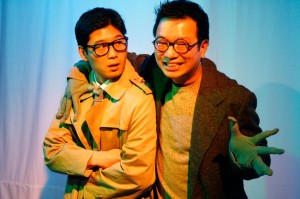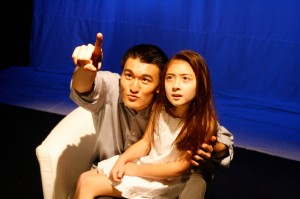Theater Review: “After the Quake” at Company One
An elegant and sleek meditation on the reverberations of trauma adapted for the stage from a collection of stories by Japanese writer Haruki Murakami.
After the Quake, based on the stories “Honey Pie” and Super-frog Saves Tokyo” by Haruki Murakami, which were translated from the Japanese by Jay Rubin. Adapted for the stage by Frank Galati. Directed by Shawn Lacount. Presented by Company One at the Boston Center for the Arts, Boston, MA, through August 15.
Reviewed by Bill Marx

Frog (Mike Tow) embraces Katagiri (Martin Lee) in the Company One production of “After the Quake.”
In his mind-bending stories and novels, Japanese writer Haruki Murakami transforms the repressed traumas of lost souls into a full-fledged metaphysical adventures; suddenly assaulted by a sense of disillusion, confusion, and disconnection, his (apparently) well-adjusted though nebbishy characters are jolted out of complacency and launched onto semi-parodic, surrealistic underground quests, searching through the depths of personal and cultural memory for meaning. These roller-coaster crusades into the primitive have made Murakami into a worldwide best seller – he’s especially popular among the young, who are attracted to his use of sci-fi, fantasy devices and Western pop culture references.
In 1995 two nearly consecutive instances of real life violence shaped his customary concern with the restoration of broken selves: the January Hanshin earthquake around Murakami’s hometown Kobe and the March Aum Shinrikyo sarin gas attack in Tokyo’s subway.
The author deals with the aftermath of terrorism in his superb 1997 non-fiction volume “Underground: The Tokyo Gas Attack and the Japanese Psyche” which is made up of transcriptions of Murakami’s interviews with 60 survivors of the attack. His emphasis is not on the victims’ health problems (though these are not neglected) but on what he calls their “secondary” trauma: the callous mistreatment they received once they returned to their everyday lives. The slim short story collection “after the quake,” published in 2000, focuses with gentle power on characters whose lives have been touched, directly and indirectly, by the earthquake.
Director and performer Frank Galati of the Steppenwolf Theatre Company recognized the connections between the book’s multi-layered vision of the reverberations of catastrophe with 9/11 and in 2006 adapted two tales from the collection, “Honey Pie” and “Superfrog Saves Tokyo,” for the stage. The piece is an elegant and sleek meditation on the haunting echoes of trauma — a minimalist miniature (flecked with reminders of Noh Theatre) staged with considerable skill by Company One.

Sayoko (Giselle TY) and Junpei (Chen Tang) get serious.
Galati interweaves two stories, both revolving around fending off monsters that disturb the dreams of ordinary people. Ever since the Kobe earthquake a girl, Sala (Sydney K. Penny), has had nightmares about the Earthquake Man, a dark figure that wants to imprison her and those she loves in a box. Her mother, Sayoko (Giselle Ty), calls over her longtime friend, the short story writer Junpei (Chen Tang), to calm Sala down. Junpei has been in love with Sayoko since they met in university, but he has been content to be a third wheel after she married their mutual friend, the self-confident Takatsuki (Martin Lee). Self-protective to a fault, Junpei’s shaken reaction to the Kobe earthquake transforms him, as a man and an artist.
The other tale’s creatures include a six-foot frog that enlists an accountant in his coming confrontation with “Worm,” a giant angry creature who, while lounging underneath Toyko, threatens to trigger a deadly earthquake if not stopped. As usual in Murakami, the battleground is the ‘other world’ of the unconscious. Each story ends with a vision of undisturbed sleep – nighttime demons banished, at least for now.
Michael Tow’s folksy manner as the narrator, firmly lodged in the unfortunate Story Theater tradition, irritates at times, but his energetic turn as the fleet-hopping Frog, darting about the stage as if he was on the tail of an especially elusive fly, is apt and amusing. As Katagiri, Lee leans a bit too hard on the cartoonish worrywart stereotype, but he is effective as the matter-of-factly arrogant Takatsuki.

Junpei (Chen Tang) tells a story to Sala (Sydney Penny).
Chen Tang makes for an overwhelmingly bright and brash Junpei; his performance will most likely develop some shadings as the run proceeds, with the actor settling down to suggest, quietly, his character’s inner turmoil. “after the quake” is one of Murakami gentler books, spare and cryptic: the relationships between the characters, especially between Junpei and Sayoko, are sketched in firmly but lightly. Giselle Ty, as Sayoko, is also somewhat heavy handed; the unspoken attraction, the brittle yearning, between the two needs to be insinuated with more understated care.
The two musicians on stage, Shaw Pong Liu on violin and James Wylie on bass clarinet, aid and abet the delicate atmosphere wonderfully, especially when the actors and music synchronize, sound and movement generating a seamless emotion. Those moments are testaments to director Shawn Lacount’s care and intelligence.
Murakami’s massive literary celebrity led critics early on to tag him as nothing but a superficial entertainer, successful because of his American pop culture references and a Japanese amicable for easy translation into English. But his 1994 novel “The Wind-Up Bird Chronicle” convinced many of the author’s most vocal detractors, including Nobel prizewinner Kenzaburō Ōe, that Murakami was a rarity – a considerable artist whose books also appeal to twenty-somethings around the globe.
Kudos to Company One for staging an engaging work that not only appeals to the young, but provides a showcase for some of Boston’s Asian performers, who, as a production handout points out, have not had many recent opportunities to shine in Boston theater.
Also, Company One’s coming season includes a number of world premieres, including some scripts by youngish playwrights: “The Overwhelming,” a New England premiere by J.T. Rogers, “The Good Negro,” a New England premiere by Tracey Scott Wilson, “The Emancipation of Mandy and Miz Ellie,” a world premiere by local playwright and director Lois Roach, and finally “Grimm,” a world premiere featuring short adaptations of fairy tales by local playwrights, Melinda Lopez, Ronan Noone, and Marcus Gardley among others. As always, the proof is in the quality of the productions, but Company One is keeping a valuable eye on the future.
 In contrast to Company One, demographic gridlock rules elsewhere. A case in point: Gloucester Stage Company’s lineup this summer features dramatists – Neil Simon, Edward Albee, Israel Horovitz, David Hare, and Joan Didion – who come out of the 1960s (give or take a few years before and after), and are now in their sixties or well beyond. Most are veterans of the lefty counterculture, “names” to attract boomers and the older crowd.
In contrast to Company One, demographic gridlock rules elsewhere. A case in point: Gloucester Stage Company’s lineup this summer features dramatists – Neil Simon, Edward Albee, Israel Horovitz, David Hare, and Joan Didion – who come out of the 1960s (give or take a few years before and after), and are now in their sixties or well beyond. Most are veterans of the lefty counterculture, “names” to attract boomers and the older crowd.
Is there anyone excited — aside from gray panthers — about a new play by Israel Horovitz? Crowds under 50 panting to see David Hare’s “The Breath of Life”? Produced in London in 2002 as a vehicle for two great actresses, Judi Dench and Maggie Smith, the script focuses on a pair of women in their sixties jawboning, at excessive length, about how much they don’t care that they were both rejected by the same man years before.
The Hare and the others on the GSC docket may be well-acted productions worthy of dozens and dozens of Irne Awards. But at some point theaters should stop catering single-mindedly to boomers and venture into new territory with playwrights who are under 50. Company One, now moving into its 11th season, is a troupe taking on this necessary challenge.

